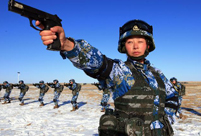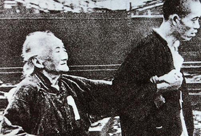 Fighters of Lanzhou MAC in confrontation training
Fighters of Lanzhou MAC in confrontation training
 3D printing to trigger third industrial revolution
3D printing to trigger third industrial revolution
 Top 10 brands that win rich women's hearts
Top 10 brands that win rich women's hearts
 Deng Xiaoping: 'I have a clear conscience all my life'
Deng Xiaoping: 'I have a clear conscience all my life'
 Xi Jinping: 'The people are our strength'
Xi Jinping: 'The people are our strength'
 Amazing cliff diving in cold winter
Amazing cliff diving in cold winter
 Enjoy Sochi 2014 in slow motion
Enjoy Sochi 2014 in slow motion
 University student sentenced to death for poisoning roommate
University student sentenced to death for poisoning roommate
 Chinese lunar New Year celebrated in San Francisco
Chinese lunar New Year celebrated in San Francisco
BEIJING, March 5 -- Money, technology and talent are seldom in short supply for Liu Yonghao, head of China's largest animal feed producer. However, "the king of animal feed" is constantly hungry for imported original materials.
"Sixty percent of China's imported maize quota are given to state-owned firms while almost 99 percent of Chinese animal feed producers are run by private capital," said Liu, CEO of New Hope Group and a deputy to the National People's Congress (NPC), the country's parliament.
The contrast mirrors the unbalanced role of government and market in relocating resources, said Liu, who decided to call for a negative list approach in industrial market access at the ongoing NPC annual session, which opened on Wednesday.
The approach means all sectors are equally open to state, private and foreign market players as long as there are no specific prohibitions.
There were more than 12 million private firms with over 200 million employees by the end of 2013 in China and the private sector contributed about 60 percent to the total GDP and 85 percent of job opportunities, according to data from the All-China Federation of Industry & Commerce.
The federation will submit 45 proposals and deliver 11 speeches on improving the market and law environment for private firms during the two sessions, said Zhuang Congsheng, vice president of the federation and a deputy to the NPC.
"We hope the government will remove all glass ceilings that block equal participation and fair play in the market to energize the private sector," Zhuang added.
Government administrative approvals which complicate market access procedures by requiring firms to receive the government's nod for business are the main restriction that shackled the private economy's vitality.
Differential treatment in the financial sector is a major headache among others for the private economy. Unlike Liu's deep-pocketed company, most private firms are cash-strapped and have financing problems given their small size and unfair financing regulations.
State-owned firms have issued inter-bank bonds worth 7.25 trillion yuan (1.18 trillion U.S. dollars) during the past three years, but for private firms it is only 450 billion yuan.
"It is easier for state-owned companies to earn the top rating on the bond market, but why is it that private firms with the same credit, scale and even less risk and higher profitability can only snatch an inferior rating?" Liu asked.
The Chinese leadership vowed last year to reduce over one third of 1,700-plus administrative approval items during their stewardship, and now more than 300 items have been relinquished or delegated to lower governments.
Meanwhile, the pilot Shanghai Free Trade Zone is now experimenting a negative list approach and other innovations to facilitate private economy and is expected to be the test ground for expansive national financial and political reforms.
The pace of reform is expected to accelerate, and its scale to expand this year.
Chinese Premier Li Keqiang said on Wednesday in the government work report that another 200-plus administrative approval items will be cut this year, which will help reduce unnecessary government intervention in the market.
In addition, China will facilitate partnerships between state-owned and private firms in highly monopolistic sectors and allow access to franchise business. "We will set a bigger stage to bring the private capital's potential into full play," Li said.
 Chaihe village, pure and peaceful fairyland in snow
Chaihe village, pure and peaceful fairyland in snow Belgians warmly welcome arrival of China's giant pandas
Belgians warmly welcome arrival of China's giant pandas Female marines receive tactical training in NW China
Female marines receive tactical training in NW China Blood memory: Nanjing Massacre in 1937
Blood memory: Nanjing Massacre in 1937 Top 10 pure beauties in showbiz
Top 10 pure beauties in showbiz British WWII veteran: I can't forgive Japan
British WWII veteran: I can't forgive Japan Tongban's dream of prosperity
Tongban's dream of prosperity Chinese frigate Yancheng holds drills in Mediterranean Sea
Chinese frigate Yancheng holds drills in Mediterranean Sea A visit to comfort woman's home in South Korea
A visit to comfort woman's home in South Korea Fairyland? Qingdao in sea of clouds
Fairyland? Qingdao in sea of clouds Top 10 most handsome faces in Asia in 2013
Top 10 most handsome faces in Asia in 2013 Female celebs with beautiful long legs
Female celebs with beautiful long legs Cat 'guardians' in Forbidden City
Cat 'guardians' in Forbidden City Large numbers of ancient coins excavated in Inner Mongolia
Large numbers of ancient coins excavated in Inner Mongolia Leisurely life beneath Zhonggulou, where time travels slower
Leisurely life beneath Zhonggulou, where time travels slowerDay|Week|Month